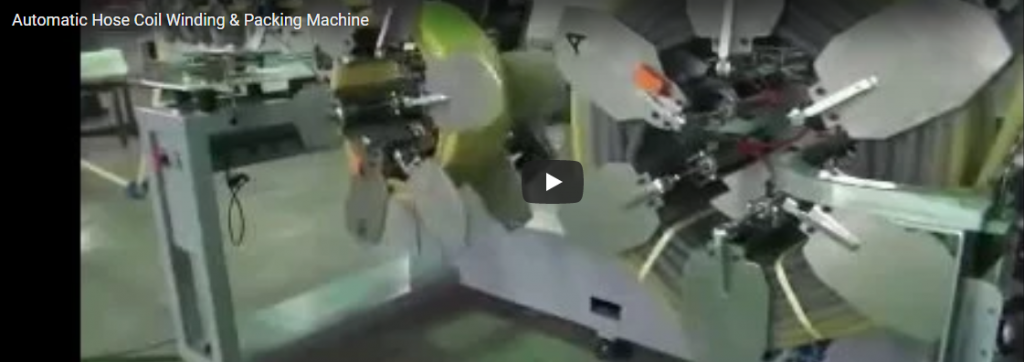Optimizing Pipe & Hose Handling: A Closer Look at Automatic Coiling and Wrapping Machinery
Manual coiling and wrapping of pipes and hoses is often a bottleneck in production – it's labor-intensive, time-consuming, and can lead to inconsistencies in coil size and wrap quality. Investing in automatic pipe coiling and wrapping machinery offers a robust solution, significantly enhancing efficiency and product presentation. This technology represents a leap forward for manufacturers dealing with various types of flexible pipes and hoses.
1. Core Functionality: Precision Automation at Work
At its heart, this automatic coiler machine is engineered to streamline pipe and hose handling from end-of-line production to final packaging. Here’s how it typically operates:
- Length Calculation: The system precisely measures the incoming pipe or hose length, often using encoder feedback.
- Automatic Cutting: Once the pre-set length is reached, an integrated cutting mechanism cleanly severs the pipe/hose.
- Coiling: The machine automatically forms the pipe or hose into a neat coil, adhering to specified inner and outer diameter parameters.
- Strapping/Wrapping: Integrated systems apply securing straps or wrap the coil tightly with materials like stretch film (LLDPE, PE, PVC) to maintain its shape and protect the product.
- PLC Control: All these operations – length setting, coil dimensions, cutting points, wrapping parameters – are managed via a Programmable Logic Controller (PLC) with a user-friendly interface. This allows operators to easily set up and adjust parameters for different product runs, ensuring repeatable accuracy and efficiency.
2. Key Technical Specifications
Understanding the machine's capabilities is crucial. Here are typical specifications for this type of hose coiler and wrapper:
- Coil Inner Diameter (ID): 120mm - 300mm
- Coil Outer Diameter (OD): 300mm - 500mm
- Maximum Coil Width: 200mm
- Coil Weight Capacity: 5kg - 50kg
- Compatible Packing Materials: LLDPE stretch film, PE film, PVC film
- Main Wrapping Speed: Adjustable, typically ranging from 18 - 35 seconds per coil
- Maximum Coiling Ring Speed: Up to 100 RPM
- Power Requirements: Commonly 380V, 60Hz, 3-Phase (Variations may be available based on regional standards)
Note: Specifications can vary between models and manufacturers. Always confirm details for the specific machine.
3. Applications Across Industries
The versatility of automatic pipe coiling and wrapping systems makes them suitable for a wide range of applications, including:
- Manufacturing of PE, PEX, PVC pipes for plumbing and construction.
- Production of corrugated conduit for electrical and telecommunications.
- Handling of garden hoses, industrial hoses, and hydraulic lines.
- Any production line where flexible tubes, pipes, or hoses need to be efficiently coiled and packaged.
4. Operational Efficiency and Return on Investment (ROI)
From our experience working with manufacturers, the transition from manual to automatic coiling yields significant benefits:
- Reduced Labor Costs: Automation drastically cuts down the manual labor required for coiling, strapping, and wrapping.
- Increased Throughput: The machine operates consistently at high speeds (e.g., 18-35 seconds per coil), significantly outpacing manual methods.
- Improved Consistency: Automated processes ensure every coil meets the exact pre-set specifications for size and tightness, enhancing product quality and appearance.
- Enhanced Safety: Reduces repetitive strain injuries and potential hazards associated with manual handling of bulky coils.
- Material Savings: Optimized wrapping can lead to more efficient use of packing materials like stretch film.
These factors contribute to a strong Return on Investment (ROI), making the automatic coiling machine a valuable asset for streamlining operations and improving profitability.
5. Integration and Reliability
Designed for industrial environments, these machines prioritize high reliability and low maintenance requirements. They can often be integrated directly into extrusion lines or positioned as standalone units within a packaging workflow. The robust construction ensures durability for continuous operation.
Conclusion
The automatic pipe coiling and wrapping machine is more than just equipment; it's a strategic tool for optimizing production flow. By automating the labor-intensive tasks of measuring, cutting, coiling, and wrapping, manufacturers can achieve greater efficiency, consistency, and cost-effectiveness in handling pipes and hoses. For companies looking to enhance their production capabilities and gain a competitive edge, exploring this technology is a worthwhile endeavor.
For further inquiries or specific requirements:
info@fhopepack.com
Explore related machinery options:
https://www.fhopepack.com/Horizontal-Coiling-Machine/
To understand more about advancements in manufacturing technology, consider resources like the Society of Manufacturing Engineers (SME).






